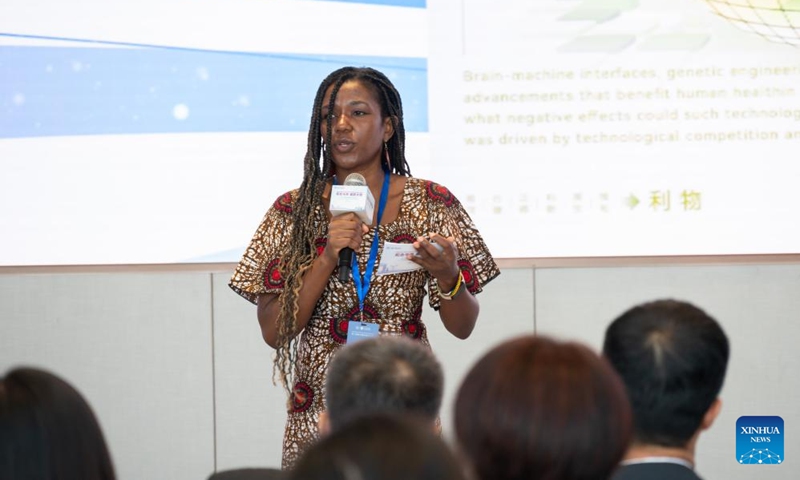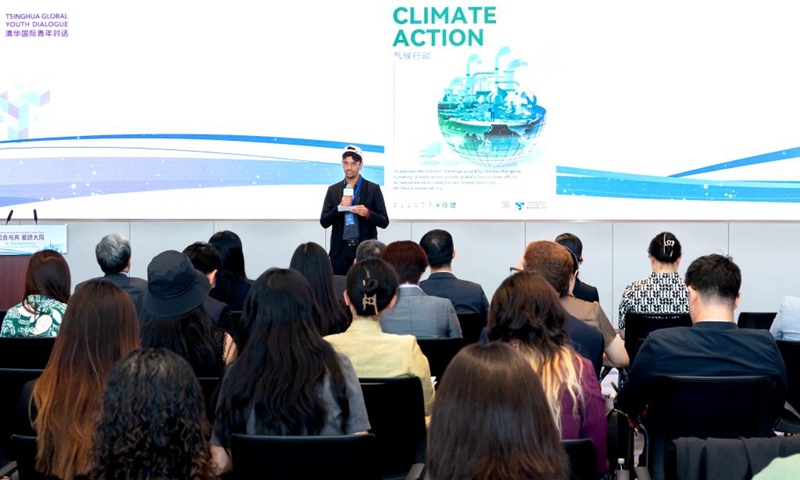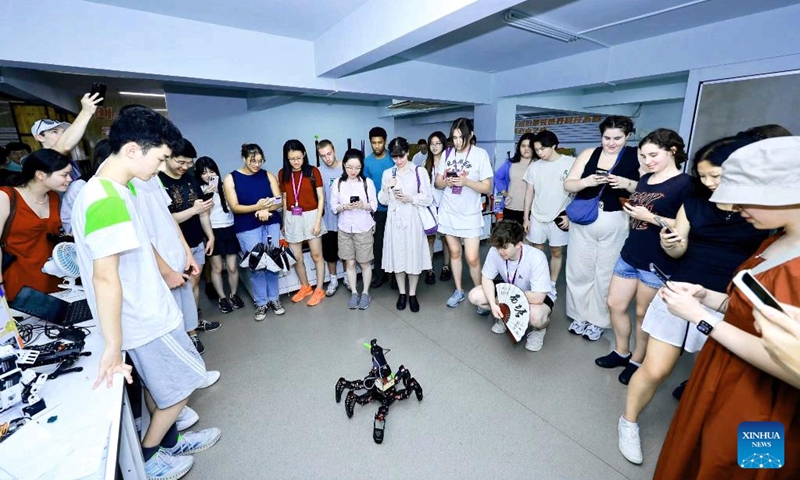
Jenipher Asiimwe speaks at the main forum of the second Tsinghua Global Youth Dialogue held in Tsinghua University in Beijing, capital of China, Aug. 29, 2024. Photo: Xinhua
Amr Wahba, 31, loves the weather in southern China, calling it "warm and pleasant" compared to the climate in his hometown in Egypt.
Since arriving in Beijing to pursue doctoral study in pharmaceutical science at Tsinghua University last year, Wahba has traveled to various places in China, including Hangzhou city in the Yangtze Delta, where he celebrated the Spring Festival. His most recent trip to Inner Mongolia Autonomous Region in August marked his first journey to a northern region outside the Chinese capital.
Wahba's travel opportunity came through the Tsinghua Global Youth Dialogue (TGYD), an intercultural initiative established by Tsinghua in 2023. TGYD invites young people from around the world to participate in tours and forums in China, fostering mutual understanding, promoting cooperation and encouraging engagement in addressing global challenges.
The main forum of the second TGYD took place on Aug. 29 and 30 at the Tsinghua campus, featuring two days of keynote speeches and discussions after the participants completed their tours to different parts of China earlier in the month.
Beginning their journey with a four-day visit to Shanghai on Aug. 19, 100 young participants, which include students, researchers and entrepreneurs from 35 countries, were later divided into three groups to explore southwestern province of Guizhou, eastern province of Zhejiang, and Inner Mongolia in the north.
In Inner Mongolia, Wahba was inspired by the solutions to desertification in Ordos, a city with approximately one-sixth of China's proven coal reserves, which, however, is shifting towards green economic development. He said it reminded him of similar efforts in Egypt, where over 90 percent of the land is desert.
"When they are changing the desert to become more green, they are thinking about adding more traditional medicine," he said, referring to the various herbs planted to combat sand encroachment, including some placed beneath solar panels in the desert.
Wahba, whose brother works in Egypt's new energy sector and is eager to explore potential collaboration with China, finally saw the widely used photovoltaic equipment he had heard about before.
According to statistics from the Ordos government, the value added in the city's wind and photovoltaic equipment manufacturing sectors experienced a 5.6-fold increase year on year in the first half of this year.
"Transferring the technology (related to new energy) will be very helpful for us," Wahba said, adding that the trip to Inner Mongolia served as a very useful experience for him.
According to Zhang Runzhou, deputy director of the Center for Global Competence Development at Tsinghua University, the TGYD tours have allowed young people to witness firsthand China's efforts in poverty alleviation, building a harmonious society and advancing green development.
Jenipher Asiimwe, a master's student majoring in film and television production at the Communication University of China, echoed Zhang's views. She said she was deeply impressed by her tour to Zhejiang, a province that was once part of ancient China's fertile Jiangnan region and is now a major innovation powerhouse.
Asiimwe, who hails from Uganda and has worked as a journalist in Africa for many years, highlighted the inclusiveness of innovation and the abundant opportunities for young people that she observed during her visits to science parks, technology companies, ancient towns, and a prosperous village known for its economic development success.
"Instead of looking for white-collar jobs, which is one of the norms of most African youth, what I've learned from here is that after graduating from university, you don't need to be employed by someone, you can create your own company and employ fellow youths in those companies," she said.
Asiimwe noted that she expects to see more cooperation between China and Africa, not just in infrastructure -- where Ugandans have already benefited from several projects -- but also in the digital economy, media and communication, and people-to-people exchanges.
"Let more young people come and experience what the real China is. I've already experienced it and now know the real China, not what we read on the internet," she said.
"Civilization flourishes through exchange and mutual learning," said Shi Zongkai, deputy chairperson of the University Council of Tsinghua University, at the opening ceremony of the TGYD main forum.
"We aim to create a global network for youth cooperation and communication, a community encouraging more profound interactions and collaborations and leading to a safer, more prosperous, and peaceful coexistence for humanity," he added.
For Hashim Amir Bashir, a 25-year-old Nigerian graduate of Beijing-based Beihang University, the significance of such an exchange opportunity is "huge" because it gives an opportunity to sit together, talk, and realize that people from across the world can work collaboratively.
This year, Bashir launched his business in the field of artificial intelligence (AI) with Chinese partners. During his visits to Shanghai and Zhejiang, the young entrepreneur felt "excited" and "motivated" by visiting technology companies, which deepened his understanding of entrepreneurship in China.
"It also proved to me that China is willing to help international people to come and start up their businesses, and also help them at the same time to connect with the rest of the world," he said.
Bashir plans to encourage more African youth to work and engage in entrepreneurship in China. He said he hopes that the 2024 Beijing Summit of the Forum on China-Africa Cooperation, scheduled for Sept. 4 to 6, will foster greater consensus on cooperation, including increased people-to-people exchanges.
He noted that Africa is one of China's key partners and vice versa, expressing optimism about achieving significant milestones and enhancing their relationship in the future.

Amr Wahba speaks at the main forum of the second Tsinghua Global Youth Dialogue held in Tsinghua University in Beijing, capital of China, Aug. 29, 2024. Photo: Xinhua

Participants of the second Tsinghua Global Youth Dialogue watch a robot performance in Hangzhou, east China's Zhejiang Province, Aug. 25, 2024. Photo: Xinhua
